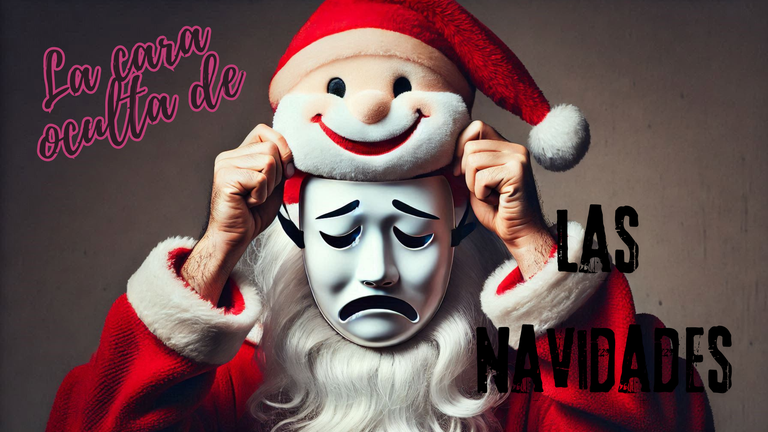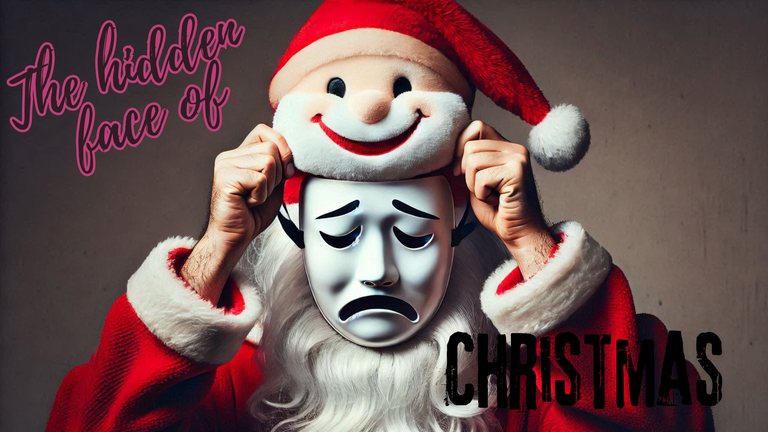
Llegó la Navidad y luego llegará el fin de año, y con ellos los miles de mensajes de buenos deseos para lograr lo que en tantísimos años no hemos logrado pero que muy probablemente este que llega será el definitivo porque, sin duda alguna, será diferente a todos sus predecesores -nótese el sarcasmo-. Lo cierto es que todos esos mensajes vienen acompañados del compromiso tácito de reunirse con la familia y amigos para celebrar el espíritu navideño y todo lo bueno que hay que celebrar. Sin embargo, se trata de un ritual occidental, y como ritual, supone asumirlo sin dar lugar a la reflexión ni al sentido que hay detrás. Veamos.
Las navidades son conocidas en casi todo el mundo occidental y en el oriental, precisamente debido al fenómeno de la globalización, que hace que se exporten patrones de consumo occidental que terminarán por suplantar de manera hegemónica las prácticas culturales de los países receptores. Ya sea que dichos patrones se asuman como tal o convivan con las prácticas culturales de los países, dependerá de las características de cada contexto. Las navidades forman parte fundamental de este fenómeno, más allá de la connotación religiosa, por el impacto que tiene en las economías porque indudablemente se trata de un período del año en el que se disparan las ventas de los negocios que buscan obtener una pieza del pastel. No por gusto se instauró la práctica del Black Friday que marca el inicio de las ventas navideñas, lo cual es algo que cada vez se ve más en cada rincón del planeta.
Mientras cada vez más formamos parte de toda la parafernalia consumista que nos llega desde el capitalismo tardío, repetimos y repetimos una tradición que si bien puede que no sea autóctona, nos lleva a representar una realidad como única posible, a la vez que muchas personas sin darnos cuenta, sufren por ello ya sea participando, o no, de dichas festividades. Ocurre que La Navidad o las navidades, o diciembre en general, está cargado de mensajes que pueden resultar muy estresantes para las personas por muchas razones que desarrollaré a continuación.
Lo primero y principal es que se trata de un mismo mensaje «para todos y todas», o sea, una misma realidad, cuando sabemos que cada quien vive con sus propias condiciones objetivas y subjetivas, lo cual quiere decir que todas las personas tienen un punto de partida diferente a la hora de celebrar en estas fechas. Pero, si bien es cierto que cada cual debe ser capaz de celebrar a su manera y según sus posibilidades, muchas veces el listón es tan alto y tan rígido que las personas experimentan malestar por no cumplir con lo esperado por la sociedad para la fecha. Y es que el mensaje es muy claro: La Navidad tiene que ser lo más rimbombante posible, porque de lo contrario no hay Navidad que valga. Es tan claro que a donde quiera que llegas te preguntan qué hiciste por la fecha, precisamente porque se espera que hayas hecho algo, se espera que seas un buen ciudadano y consumas una tradición sin saber que la mercancía eres tú. Y no, no todas las personas poseen el mismo nivel adquisitivo para participar de las navidades como se espera precisamente porque no todas las personas tienen igual acceso a oportunidades debido a diferentes factores como su contexto socioeconómico, su raza, su territorio, incluso su género.
Además, y siguiendo la misma línea, está el tema de la presión que los mensajes navideños suponen, pues empujan a la celebración, a la reunión familiar, al festejo y a la alegría obligatoria porque existe algo que le llaman «espíritu navideño» que sí o sí tienes que tenerlo porque de lo contrario te conviertes en el averno, en la encarnación de Satanás en la tierra y terminas por ser mal visto. Vamos, una romantización de la familia y de la alegría y el jolgorio que termina por anular completamente la realidad de cada quien. ¿Qué ocurre?, pues que no necesariamente todos y todas queremos o estamos listos para encarar a la familia, porque por mucho que quieran hacer ver a la familia como ese ente social perfecto, en muchos casos para no decir en la mayoría, no lo es, sino que, por el contrario, es fuente principal de malestar y angustia por muchas razones que pueden ir de un pasado traumático a simplemente cuestiones de intereses y perspectivas.

Eso es por un lado. Por el otro tenemos que el empuje a festejar no siempre es bien recibido porque nadie sabe por la situación que cada quien está atravesando y si las navidades vienen a remover el malestar de base. Muchas personas atraviesan por pérdidas, duelos, rupturas, fracasos, problemas en general y pueden sentir que festejar no es compatibles con ellas ahora mismo, que no se sienten con el deseo de hacerlo, o que simplemente no les apetece juntarse con personas y dar brincos de alegría porque no les gusta y ya. Todo eso está perfectamente bien y debe ser aceptado como tal, porque hasta ahora no somos máquinas programadas por mucho que nos quieran adoctrinar. Cada quien tiene todo el derecho del mundo para decidir qué hacer con su día, cómo sentirse, y que nadie lo juzgue por ello.
Al final, La Navidad, tal y como nos la quieren vender, no llega a ser tal justo porque detrás de todo ese espíritu navideño, esos arbolitos, esos colores y villancicos, se esconde una realidad de la que no se habla precisamente porque no se quiere saber de ella, ya sea porque se trata de una realidad que no vende o porque la generalidad es que las personas no están acostumbradas ni dispuestas a lidiar con el malestar ajeno. Es preferible hacer como que todo está bien y que sea puro yinguerbel, como el meme.
Mis deseos para esta Navidad, y para todas las que estén por venir, es que seamos más empáticos y menos pericos que repiten lo mismo año tras año, que celebremos lo que queramos celebrar y no lo que nos dicen que tenemos que celebrar, y eso es si realmente queremos celebrar algo, si realmente tenemos un motivo genuino para hacerlo, que no nos falte juicio y lucidez para cuestionar todo lo que creemos porque la realidad no se circunscribe a nuestra nariz, y que sepamos comprender que este día es sencillamente el día después de ayer y antes de mañana, y que si tú lo quieres adornar con tus privilegios de clase estás en todo tu derecho, pero no se lo exijas a nadie más ni pongas tu realidad como la única posible, porque de tu burbuja para afuera, la vida se compone de personas que lo único que tienen en común son lo diferentes que son entre ellas.
English version

Christmas has arrived, and soon the end of the year will follow, bringing with them thousands of messages filled with good wishes for achieving what we haven’t managed to accomplish in so many years, but which we are very likely to achieve this time, because without a doubt, this year will be different from all its predecessors —note the sarcasm. The truth is, all those messages come accompanied by the implicit commitment to gather with family and friends to celebrate the Christmas spirit and all the good things worth celebrating. However, this is a Western ritual, and as a ritual, it is adopted without much reflection or consideration of the meaning behind it. Let’s take a closer look.
Christmas is widely known throughout the Western world and even in the East, precisely due to globalization, which exports Western consumer patterns that ultimately supplant, in a hegemonic manner, the cultural practices of the receiving countries. Whether these patterns are embraced as they are or coexist with the local cultural practices depends on the characteristics of each context. Christmas has become a fundamental part of this phenomenon, transcending its religious connotations due to its economic impact. Undoubtedly, this is a time of year when sales skyrocket as businesses aim to get their piece of the pie. It’s no coincidence that the practice of Black Friday was established to mark the beginning of the Christmas shopping season, something that is increasingly seen in every corner of the planet.
As we increasingly participate in the consumerist spectacle brought to us by late-stage capitalism, we perpetuate a tradition that, although it may not be native to us, compels us to represent a reality as the only possibility. Meanwhile, many people, whether they partake in these festivities or not, end up suffering because of them. The issue is that Christmas, or the holiday season in general, is laden with messages that can be incredibly stressful for people for various reasons, which I’ll explore below.
The first and most important point is that it’s a single message “for everyone,” a one-size-fits-all reality, even though we know that everyone lives under their own objective and subjective conditions. This means that everyone starts from a different place when it comes to celebrating this time of year. While it’s true that each person should celebrate in their own way and according to their means, the bar is often set so high and so rigid that people feel discomfort for failing to meet society’s expectations for the season. And the message is clear: Christmas has to be as extravagant as possible, or else it’s not Christmas at all. It’s so clear that everywhere you go, people ask what you did for the occasion because it’s expected that you did something; it’s expected that you’re a good citizen and partake in a tradition without realizing that the commodity is you. But not everyone has the same financial means to participate in Christmas as expected, simply because not everyone has equal access to opportunities due to factors like socioeconomic status, race, location, or even gender.
Furthermore, the pressure created by Christmas messages pushes people to celebrate, to gather with family, to rejoice, and to embrace mandatory cheer because there’s this thing called the “Christmas spirit” that you must have; otherwise, you’re practically the embodiment of Satan on Earth and end up being judged. It’s a romanticization of family, joy, and revelry that completely disregards each individual’s reality. What happens then? Not everyone necessarily wants to or is ready to face their family. Despite the idealized image of family as a perfect social unit, in many cases—if not most—it’s far from that and instead becomes a primary source of distress and anguish for a myriad of reasons, from traumatic pasts to simply differing interests and perspectives.

On the other hand, the push to celebrate isn’t always well-received because no one knows the personal situations each individual is dealing with, and Christmas may exacerbate underlying distress. Many people are going through losses, grief, breakups, failures, or general problems and may feel that celebrating doesn’t align with their current state. They might not feel like celebrating, or they might simply not want to gather with people and pretend to be joyful because it’s not who they are—and that’s perfectly fine. It must be accepted as such, because despite efforts to program us like machines, we’re still human. Everyone has the right to decide how to spend their day, how to feel, and to be free of judgment.
Ultimately, Christmas, as it’s sold to us, never fully lives up to its ideal. Behind all that Christmas spirit, the trees, the colors, and the carols, lies a reality that remains unspoken—perhaps because it doesn’t sell or because people generally aren’t accustomed to or willing to deal with others’ discomfort. It’s easier to pretend everything is fine and that it’s all jingle bells, like in the meme.
My wish for this Christmas, and for all those to come, is that we be more empathetic and less like parrots repeating the same thing year after year. Let’s celebrate what we truly want to celebrate—not what we’re told we must—and only if we genuinely feel like celebrating. Let’s not lack the judgment and clarity to question everything we take for granted, because reality extends far beyond our own noses. Let’s understand that this day is simply the day after yesterday and before tomorrow, and if you want to adorn it with your privileges, you’re entirely within your rights. But don’t impose it on anyone else, nor present your reality as the only possibility. Beyond your bubble, life is made up of people who share only one thing in common: how different they are from one another.

Si deseas agendar una cita para iniciar un psicoanálisis online, no dudes en tocar sobre mi tarjeta de presentación
⬇️⬇️
Créditos | Credits
Imágenes utilizadas | Images used
Todas las imágenes utilizadas son de mi propiedad y fueron generadas utilizando Designer de Copilot y editadas en Canva | All images used are my own property and were generated using Designer from Copilot and were edited using Canva.
Traducción | Translation
Te puede interesar | You may be interested in
¿Ir al psicoanalista? | Go to a psychoanalyst? [ES/EN]
Decisiones: ¿rutas o raíces? | Decisions: routes or roots? [ES/EN]
Depresión, ¿calamidad o estereotipo? | Depression, calamity or stereotype? [ES/EN]
Las identificaciones como armas de doble filo | Identification as double-edged weapons [ES/EN]
¿Empatía o narcisismo? | Empathy or narcissism? [ES/EN]
Género, ¿ventaja o desventaja? | Gender, advantage or disadvantage? [ES/EN]
La procrastinación más allá de la pereza | Procrastination beyond laziness [ES/EN]
Las normas sociales y la grupalidad: reflexiones | Social norms and groupness: reflections [ES/EN]
Las personas introvertidas y otros demonios | Introverted people and other demons [ES/EN]



La navidad tiene un significado, pero no hay que olvidar que somos diferentes y por eso la vivimos de manera distinta. Luego se suman otros elementos como la comercialización y lo disfuncional de las relaciones familiares. Sin embargo, pienso que todo está en la actitud que le pongamos a la vida. Saludos.
Si fuera cuestión de actitud, estaríamos negando la inmensurable influencia que tiene el entorno en nosotros, y depositando toda la responsabilidad posible del malestar, en la propia persona que sufre. Prácticamente se estaría diciendo: el pobre es pobre porque quiere...
No hay que ser negativos, nosostros decidimos que nos afecta y que no. Seguir allí o irse.